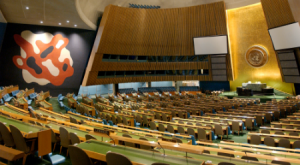General Assembly (GA)
 The General Assembly is one of the six main organs of the United Nations, the only one in which all Member States have equal representation: one nation, one vote. All 193 Member States of the United Nations are represented in this unique forum to discuss and work together on a wide array of international issues covered by the UN Charter, such as development, peace and security, international law, etc. In September, all the Members meet in the General Assembly Hall in New York for the annual General Assembly session.
The General Assembly is one of the six main organs of the United Nations, the only one in which all Member States have equal representation: one nation, one vote. All 193 Member States of the United Nations are represented in this unique forum to discuss and work together on a wide array of international issues covered by the UN Charter, such as development, peace and security, international law, etc. In September, all the Members meet in the General Assembly Hall in New York for the annual General Assembly session.
Our work falls under The following main committees of the GA:
1. Second Committee (Economic and Financial Committee)
2. Third Committee (Social, Humanitarian and Cultural Committee)
Preparations for and observance of the thirtieth anniversary of the International Year of the Family
Preparations for and observance of the thirtieth anniversary of the International Year of the Family
As part of the preparations for the thirtieth anniversary of the International Year of the Family, the report focuses on analysis of demographic trends and their impact on families and family-oriented policies. With regard to fertility decisions and maternal mortality reduction, the Secretary-General recommends provision of quality education, ensuring access to reproductive health services and family planning and investment in health-care facilities in remote areas. In terms of work-family balance, the Secretary-General suggests investing in flexible working arrangements, parental leave and high quality and affordable childcare.
With regard to ageing, recommendations are offered on social security and pensions, family-based care systems for older persons and institutional…
As part of the preparations for the thirtieth anniversary of the International Year of the Family, the Secretary-General focuses on the analysis of urbanization and migration trends and their impacts on families and family-oriented policies. He furthermore describes the current state of preparations for the observance of the anniversary at all levels.
The present report, which is submitted pursuant to General Assembly resolution 75/153, contains information on the preparations for the observance of the thirtieth anniversary of the International Year of the Family in 2024 and an analysis of the impact of new technologies on families. The report is also focused on the potential of digital technologies to help to enable the achievement of work-family balance and on the role of such technologies in promoting and facilitating parenting education.
The present report is submitted pursuant to General Assembly resolution 74/124. In the report, in view of the coronavirus disease (COVID-19) pandemic, the Secretary General addresses the impact of the crisis on families and elaborates on family oriented policies to mitigate its effects on households. He also focuses on parenting and parenting education as a tool to enhance children’s well-being and resilience in times of crisis and prevent violence against children. Lastly, he addresses the modalities for the preparations for the thirtieth anniversary of the International Year of the Family, in 2024.
The report is focused on recent family policy trends, mainly in the areas of gender-sensitive social protection, work-family balance, gender equality and family homelessness. Good practices in family policymaking by Governments, United Nations entities and civil society are also highlighted.
The report focuses on recent family trends and initiatives towards the implementation of the objectives of the International Year of the Family and its follow-up processes by Member States, United Nations entities and civil society
 Welcome to the United Nations
Welcome to the United Nations